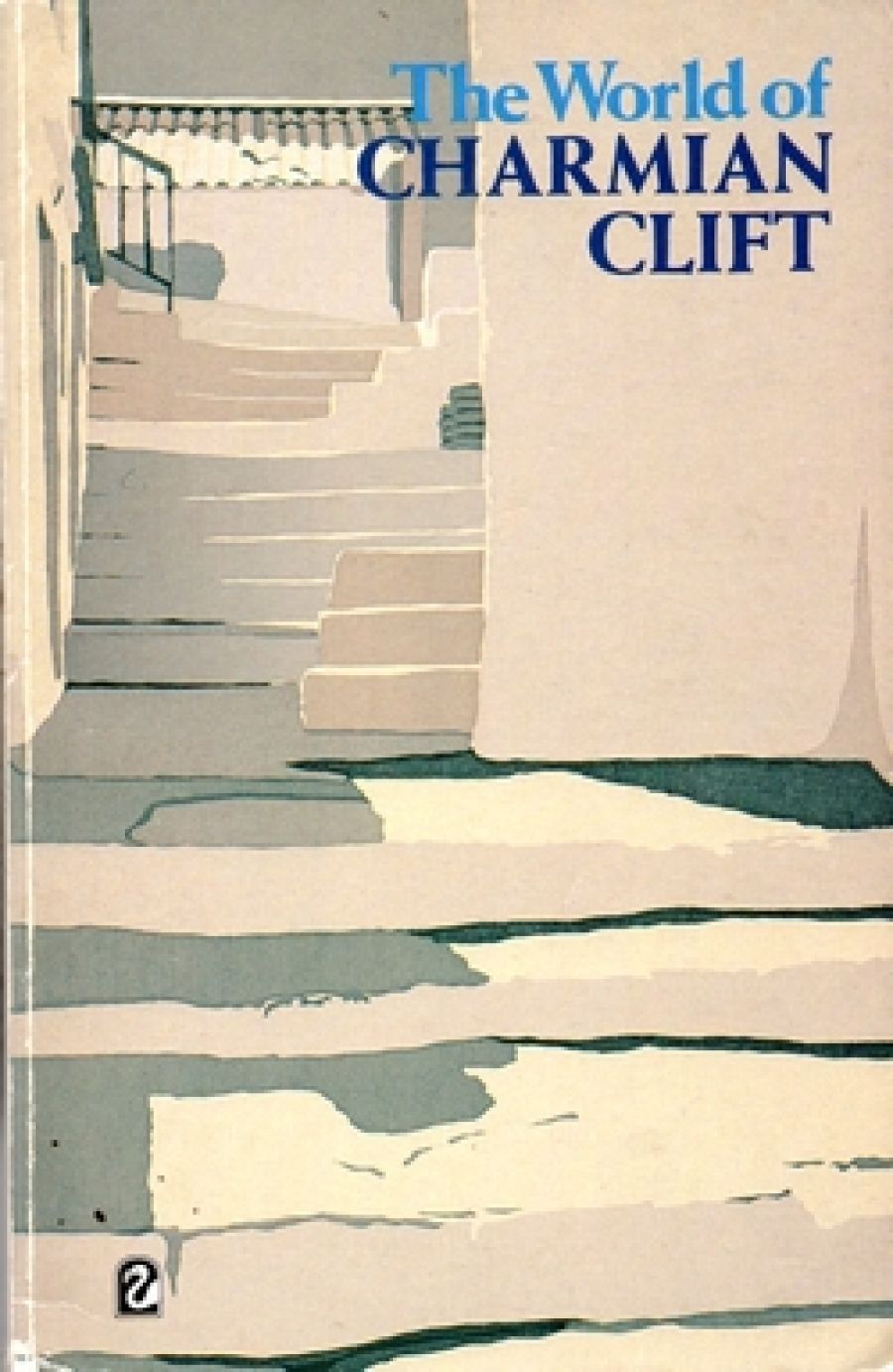
- Free Article: No
- Contents Category: Essay Collection
- Review Article: Yes
- Online Only: No
- Custom Highlight Text:
The World of Charmian Clift is a selection of the weekly columns she wrote for the Sydney Morning Herald’s women’s pages. They date from 1964, the year that she, George Johnston, and their children returned from Greece, up to her tragic suicide in 1969. Clift herself selected most of the essays for the book, which was first published posthumously in 1970, not long before George Johnston’s death from tuberculosis.
- Book 1 Title: The World of Charmian Clift
- Book 1 Biblio: Collins Imprint, $12.95 pb, 255pp, 0732225566
Charmian Clift comes across as a writer who believed in talk as a civilised and civilising pursuit; who believed that, if she put her mind to it, even the most ephemeral topic could be made to yield insights into the scheme of things. True, one does learn a lot about her and her family from the essays, but it is the vivacity of Clift’s intellect and imagination that engages the reader, rather than the autobiographical subtext.
‘Reflections on a Dripping Tap’, for example, moves from the personal to the abstract with sibylline ease. A dripping tap with a saucepan under it ‘to collect the drips for the flowers’ leads, via the British Museum Reading Room, to the great civilisations on the Tigris and Euphrates, and to the reflection that ‘what we call civilisation was only possible when man learned to control water instead of being controlled by it’.
Not long after Charmian Clift died, women’s pages disappeared from the metropolitan newspapers, but weekly columnists did not. Most broadsheets employ two or three, each attempting the sort of conversational essay Clift excelled at; none of them are comparable to her. Given half a page instead of a column, the thoughts of Phillip Adams and Max Harris ramble unedited and rarely reach a satisfying conclusion. From others we get a too-predictable weekly blast of righteous indignation or shot of wry, self-deprecating wit. What is missing is the originality, the optimism and the open-mindedness Clift shared with her readers.
Of course, besides her intellectual gifts and her writing skills, Charmian Clift did have a remarkable life to draw upon for her column. The expatriate years, first in London, then in Greece, as well as all her reading, gave her a sense of history and later sharpened her perceptions of Australian society ( without making her any less a patriot). Here she is responding to the protest movements of the mid-1960s, marked by dissension and hostility, where ‘vigils, protests, sit-ins, teach-ins and even freedom rides are becoming usual’:
One thing is certain. No state of affairs was ever bettered by putting up with it, no wrongs ever righted by passively accepting them. A cause, a purpose, a goal, a creed, an idea, a cherished attachment is the stuff all human evolution is made of. Without some belief most passionately held, we would expire for want of vitality.
Clift’s Depression-era childhood at Kiama on the New South Wales south coast was also crucial, tempering her natural vivacity with an Aussie-battler toughness that owed much to her mother. In a column titled ‘A Portrait of My Mother’, Clift remembered her first at work, wrestling with washing, weeding, gardening, ‘elaborating our glorious futures’. But then she remembers the other side, her mother’s own quiet rebellion against her house-keeping role:
But when she was watching the sea her face was different, calm and ardent, and sometimes at night, very late, I could hear her scribbling away with a scratching pen, writing poetry to be crumpled up and shoved into the fire, and once I saw her (having heard a commotion in the kitchen and poked my head around the door) stamping on a dress she had been making until three in the morning and kicking it around and around the kitchen.
For the introduction to this new edition of The World of Charmian Clift, Rodney Hall has written a warm reminiscence of the volatile and gregarious Clift he and his wife knew in Greece and later in Sydney. Still, it seems a shame that this edition lacks George Johnston’s original Introduction, with this fine tribute to Clift’s qualities as a columnist:
She wrote with a graceful and highly personal style, but she wrote to no formula … Sometimes she was very funny, sometimes very angry, sometimes very truculent – for she took up causes, often unpopular causes, if she deeply and sincerely believed in them, although she was never a professional ‘crusader’. But, whatever she had to say, she said it with great panache.


Comments powered by CComment